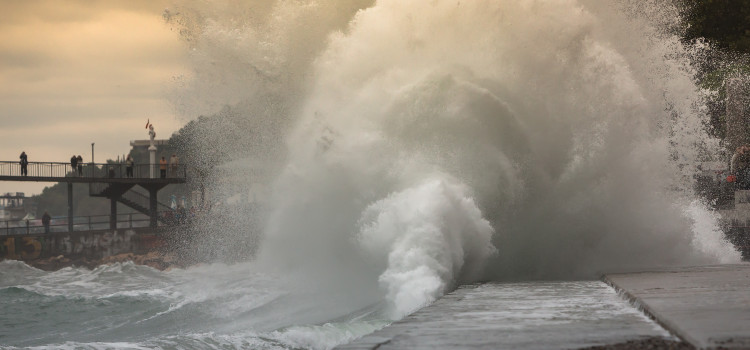Have you ever wondered how a hurricane can impact the earth’s atmosphere? Keep reading!
How do hurricanes affect the atmosphere?
A hurricane will bring extreme rainfall because warm air holds more moisture than cool air. The most powerful storms with winds over 111 mph can dump water with extreme force, temporarily increasing the volume of lakes and rivers. Flooding is one of the major risks hurricanes pose to humans.
You most likely know that hurricanes bring incredibly high winds, but they also bring extremely low atmospheric pressure. This is because their sustained wind speed causes an overturning of air masses in the troposphere. They reduce pressure by displacing lots of molecules per unit volume, which then disperse into areas away from them (atmosphere).
Contents
How Do Hurricanes Affect The Atmosphere?
How Do Hurricanes Affect The Hydrosphere?
A hydrosphere is the portion of the earth surrounding the globe and it has three different components. The first and largest component is an ocean and seas. Second, there are groundwater bodies such as lakes, ponds, rivers, and reservoirs contained on land. Third, there are water found in ice caps and glaciers.
All of these components will be greatly impacted by major hurricanes. First of all, as stated previously, hurricanes bring extreme rainfall which increases the amounts of water in hydrosphere components around the globe.
Also, hurricanes bring stronger winds which can create waves and white water conditions. These dangerous conditions occur in near the eye and periphery of a hurricane. Lastly, strong winds and pounding surf erode beaches and coastal areas, making them more susceptible to flooding.
How Do Hurricanes Affect The Biosphere?
A biosphere is a major habitat for living organisms that live on earth. It is composed of all the ecosystems worldwide such as forests, grasslands, deserts, oceans, rivers, lakes, and mountains. Hurricane winds and rain result in the erosion of land and erosion of bodies of water. This can lead to changes in the biosphere which reduces the amount of fresh water and oxygen.
This can be detrimental to human activity; it may make some areas uninhabitable or cause an increase in disease. Some disasters such as wildfires and flooding may also result from hurricanes or a tropical storm, though it is still too early to tell if this will happen.
Flooding and landslides can transport and introduce plant and animal pathogens and toxic chemicals into human populations. On the the other hand, the loss of land mass due to coastal erosion changes the habitat for native plants and native animals.
How Do Hurricanes Affect The Lithosphere?
The lithosphere is a division of the earth that consists of the crust and upper mantle (the outermost layer). Molten rock such as lava is also called magma. When a hurricane passes over a region that has a lot of lava active, magma may erupt and cause tsunamis. This storm can also cause earthquakes if enough magma comes from beneath the surface. These earthquake will shake the nearby region and cause severe damage to human structures.
How Do Hurricanes Affect The Cryosphere?
The cryosphere is the area at the earth’s poles that consists of water ice. The most common forms of ice found in the cryosphere are glaciers, ice caps, and river and lake ice. When tropical cyclones (hurricanes) approach colder climates (temperate zones), they can impact glaciers and their surroundings. For example, hurricanes can bring warmer sea temperatures to glacier fronts where chunks of ice break off into the ocean.
How Does Global Warming Affect Hurricanes?
There are many ways global warming affects hurricanes. First, as the ocean heats up from human actions, it becomes more acidic and can affect ecosystems such as coral reefs. This loss of biodiversity may cause extinction of species, but it is still too early to tell if this will happen.
Second, hurricanes can increase in intensity due to global warming because warmer oceans contain more water vapor. Warmer oceans become more active, which causes changes in the atmosphere such as an increase in thunderstorms. When these storms combine with hurricanes, the result is a super-intense storm.
Finally, as temperatures rise, hurricane season will last longer. This could be bad for places such as Florida and Texas where land flooded with water during Hurricane Harvey and Hurricane Katrina. The lack of fresh water may cause drought or desertification of these regions if they do not adapt to this change.
Conclusion
In conclusion, hurricanes change the earth’s atmospheric, hydrospheric, biospheric, and lithospheric systems. They trigger many changes that affect human populations by reducing fresh water sources and bringing new diseases to communities. Also, as a result of global warming allowing hurricanes to be more intense and last longer, these super-storms will greatly change the earth’s cryosphere and produce more tsunamis.
Hurricanes have the potential to have a great impact on human life whether they are tropical cyclones or not.

